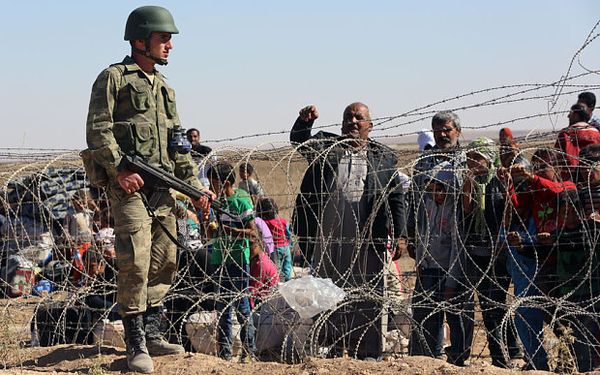 3 Quarks Daily asked a number of writers, artists, scientists, scholars, and public intellectuals to give us brief personal reflections on the Syrian refugee crisis in Europe and other places. The following have sent their thoughts and their responses are below in the order in which we received them:
3 Quarks Daily asked a number of writers, artists, scientists, scholars, and public intellectuals to give us brief personal reflections on the Syrian refugee crisis in Europe and other places. The following have sent their thoughts and their responses are below in the order in which we received them:
- Feisal Hussain Naqvi
- Robert Pinsky
- Frans B. M. de Waal
- Mohsin Hamid
- Amitava Kumar
- Gerald Dworkin
- Simon During
- Pablo Policzer
- Ejaz Haider
- Huw Price
- Laila Lalami
- Kenan Malik
- Justin E. H. Smith
Feisal Hussain Naqvi
There, but for the grace of God…
In August 1947, my father’s family left behind all their belongings and fled to Pakistan, huddled on the top of a train. They were refugees.
In December 1947, my mother and her family were in what is now Slovenia. On the day after Christmas, they decided to make a run for Austria. Fortunately for them, the guards were too busy celebrating to notice my mother and her siblings creep across the border.
I am not just the child of two refugees. I am the child of two long lines of refugees.
My father’s family are Syeds, descendants of the Prophet. The family tree treasured by my father shows a path from Arabia to Iraq to Central Asia to Iran to India and then finally, to what is now Pakistan.
My mother’s father came from solid Germanic stock. But my mother’s mother came from a family which had converted from Judaism. While my father’s ancestors had been moving eastwards, my mother’s ancestors had headed westwards.
Given that anthropologists have fairly solid grounds for tracing humanity’s common roots back to the Olduvai Gorge in Kenya, it follows that everybody residing outside East Africa moved there at one point in time. In other words, at one time or another, we have all been refugees. If not us, then our parents. And if not them, then their parents. We would do well to remember that simple fact the next time we respond to the misery of others with anything other than compassion or empathy.
Feisal Hussain Naqvi studied Islamic history at Princeton before going on to study law at Yale. He is an advocate of the supreme court of Pakistan, as well as a columnist for various newspapers.
Robert Pinsky
This passage from Adam Zagajewski’s poem “Refugees” stays with me:
There’s always a wagon or at least a wheelbarrow
full of treasures (a quilt, a silver cup,
the fading scent of home),
a car out of gas marooned in a ditch,
a horse (soon left behind), snow, a lot of snow,
too much snow, too much sun, too much rain,
and always that special slouch
as if leaning toward another, better planet,
with less ambitious generals,
less snow, less wind, fewer cannons,
less History (alas, there’s no
such planet, just that slouch).
That phrase “less History” with its capital letter, and “less ambitious generals” . . .
Robert Pinsky is an American poet, essayist, literary critic, and translator. From 1997 to 2000, he served as Poet Laureate Consultant in Poetry to the Library of Congress. Pinsky is the author of nineteen books, most of which are collections of his poetry. He teaches at Boston University.
Frans B. M. de Waal
Social Darwinism may be dismissed as old hat, a leftover of the Victorian era, but it’s still very much with us. A 2007 column by David Brooks in The New York Times ridiculed governmental support of the needy: “From the content of our genes, the nature of our neurons and the lessons of evolutionary biology, it has become clear that nature is filled with competition and conflicts of interest.”1 Conservatives love to think this, but it is not always how nature works. Nature is full of cooperative species. Taking care of each other, including sometimes outsiders, is part of the equation.
The refugee crisis is a test of the role of empathy in public policy. Do we care enough about the lives of other humans to welcome those who flee brutal warfare? There is always more involved than empathy, however. Empathy is a well-developed trait in most humans, but one that is conditional. It is subject to calculations and filters. We cannot empathize with everyone and everything equally. So apart from the “humane” reaction (a term based on the assumption that we are the only empathic species, which my work shows is false, since I consider empathy a general mammalian characteristic), there is also the more practical question of how we are going to take care of so many people and if there are alternatives, such as removing the causes for their migration.
The whole political dance around the topic is part of a long tradition of empathy affecting public policy. Another good example is the abolition of slavery (Abraham Lincoln was rather explicit about this), and also the healthcare debate in the US is one of empathy, asking the question how much we care about the health of low income citizens. Empathy is a major but poorly appreciated voice in political decision-making, and the glue of any society, even though it is never the only consideration, and always mixed with more hard-nosed economic and political considerations. The European Union is right to listen to this voice, and to counter xenophobic tendencies, which unfortunately are also part of human nature.
1David Brooks “Human Nature Redux” (New York Times, 17 February, 2007).
Frans B. M. de Waal is the Charles Howard Candler professor of Primate Behavior in the Emory University psychology department in Atlanta, Georgia, and director of the Living Links Center at the Yerkes National Primate Research Center.
Read more »
I finished reading War and Peace recently. It took me three years but I did try to read it carefully. Tolstoy defined art “as that human activity which consists in one person's consciously conveying to others, by certain external signs, the feelings he or she has experienced, and in others being infected by those feelings and also experiencing them.” This is a wonderfully robust definition – especially because it does not impose which types of “human activity” or “external signs” qualify. And I was certainly infected by the themes of War and Peace: I felt on many occasions that the book was speaking especially to me. I took notes and copied down everything that struck me.

